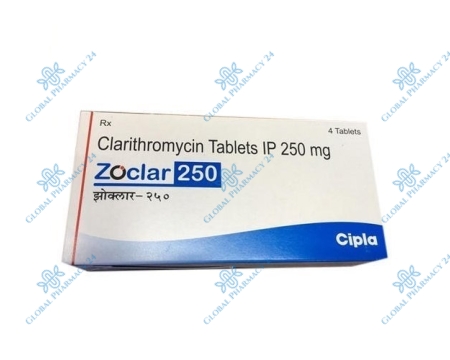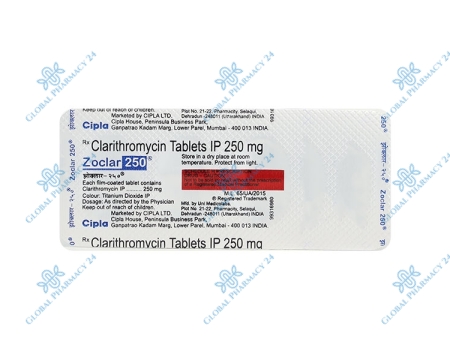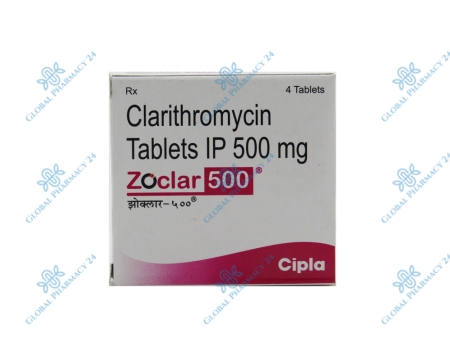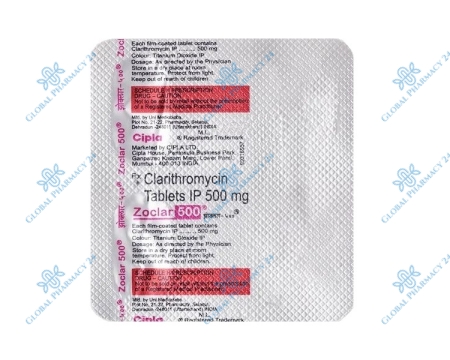| Characteristic | Detail |
|---|---|
| Active Ingredient | Clarithromycin |
| Dosage Forms | 250mg and 500mg Tablets |
| Indications | Bacterial infections, including respiratory infections and skin infections |
| Duration of Treatment | Varies based on infection type; commonly 7-14 days |
| Side Effects | Nausea, diarrhea, headache, changes in taste |
| Drug Interactions | Warfarin, statins, colchicine |
Understanding Zoclar: What You Need to Know
Zoclar is a widely prescribed antibiotic belonging to the macrolide class, aimed at treating a variety of bacterial infections. It is known for its effectiveness against a broad spectrum of bacteria, making it a go-to option for healthcare providers in managing conditions such as respiratory tract infections, skin infections, and more. The medication works by inhibiting the growth of bacteria, providing a mechanism that helps the body's immune system overcome the infection.
The significance of Zoclar in the pharmaceutical market is underscored by its versatility and potency. With options available in 250mg and 500mg dosages, it offers flexibility in treatment plans tailored to the severity and type of infection. Its active ingredient, clarithromycin, has been extensively studied, showcasing a strong track record of safety and efficacy across various age groups and conditions.
Zoclar: An Overview
Zoclar, powered by the active ingredient clarithromycin, is engineered to combat bacterial infections by halting the production of essential proteins needed by bacteria to grow. Its wide-reaching effects against numerous bacterial strains make it a staple in treatments against upper and lower respiratory tract infections, as well as certain skin conditions.
Active Ingredient in Zoclar: Clarithromycin
Clarithromycin stands at the core of Zoclar's effectiveness. This compound belongs to the macrolide antibiotics group and is celebrated for its targeted action against a multitude of bacterial infections. Clarithromycin achieves its therapeutic effects by binding to the bacterial ribosome, thus inhibiting protein synthesis and preventing bacterial growth.
Zoclar Dosage: 250mg and 500mg Options
The availability of Zoclar in both 250mg and 500mg tablets allows healthcare professionals to customize treatment based on the infection's severity and patient's health status. This flexibility ensures that patients receive the most appropriate dosage for effective treatment, with the 250mg option commonly prescribed for milder infections and the 500mg for more severe cases.
The Uniqueness of Zoclar
Zoclar differentiates itself from other antibiotics through its enhanced efficacy and reduced risk of resistance development. Its broad-spectrum activity encompasses a wide range of bacteria, including those resistant to other antibiotics. This makes Zoclar a critical option in the arsenal against bacterial infections, especially in cases where first-line treatments have failed.
Furthermore, Zoclar's formulation and the pharmacokinetic profile allow for convenient dosing schedules, typically once or twice daily, which improves patient compliance. Its ability to be absorbed with or without food also ensures that it fits seamlessly into patients' lifestyles, thereby enhancing the overall effectiveness of the treatment regimen.
Why Zoclar Stands Out
Among its peers, Zoclar is renowned for its high bioavailability and long half-life, which contribute to its standout performance in treating bacterial infections. Its compatibility with a range of other medications further underscores its utility in complex treatment scenarios, where multiple conditions might be present.
Comparable Improvement Rates to Clarithromycin
Zoclar boasts improvement rates comparable to those of its active ingredient, clarithromycin, against a wide array of bacterial infections. This similarity in efficacy demonstrates Zoclar's reliability as a treatment option, while also highlighting the consistent therapeutic outcomes it provides.
Zoclar's Effectiveness and How It Works
Zoclar's mechanism of action is centered around its ability to inhibit bacterial protein synthesis, a critical process for bacterial growth and multiplication. By binding to the 50S subunit of the bacterial ribosome, it effectively halts the production of essential proteins, leading to the bacteria's inability to grow and causing it to eventually die off. This targeted approach allows for the treatment of infections with minimal impact on the body's own cells.
The clinical effectiveness of Zoclar has been documented in numerous studies, showcasing its ability to rapidly reduce symptoms and clear infections. Its action against a wide spectrum of bacteria, including those that cause common respiratory and skin infections, makes it a versatile tool in the management of bacterial diseases.
Inhibiting Bacterial Protein Synthesis: The Zoclar Way
Through its innovative mechanism, Zoclar uniquely inhibits the synthesis of bacterial proteins, effectively stopping bacteria in their tracks. This mode of action is particularly effective against resistant strains, providing a powerful option for difficult-to-treat infections.
Proper Use of Zoclar
For optimal results, Zoclar should be taken as prescribed by a healthcare professional. The dosing regimen typically involves taking the medication once or twice daily, depending on the nature and severity of the infection. It's crucial for patients to complete the full course of treatment, even if symptoms improve, to prevent the development of antibiotic resistance.
While Zoclar is generally well-tolerated, patients should be mindful of potential interactions with other medications and adhere to guidelines regarding foods and activities to avoid. This includes limiting alcohol consumption and avoiding specific medications that can interact with Zoclar, such as certain statins and anticoagulants.
Things to Avoid While Taking Zoclar
While undergoing treatment with Zoclar, patients should avoid consuming grapefruit and grapefruit juice, as they can interfere with the metabolism of the medication. Additionally, patients should inform their healthcare provider of all medications they are taking to avoid potential drug interactions that could affect the efficacy of Zoclar or cause adverse reactions.
Potential Side Effects and Interactions of Zoclar
Zoclar, like all medications, may cause side effects in some patients. Commonly reported side effects include nausea, diarrhea, stomach pain, and changes in taste. While most side effects are mild and temporary, severe reactions should be reported to a healthcare provider immediately. It's important for patients to be aware of these potential side effects and to monitor their health closely while taking Zoclar.
Drug interactions are an important consideration when taking Zoclar. It can interact with a range of medications, including warfarin, certain statins, and other antibiotics, potentially leading to increased risk of side effects or reduced effectiveness of treatments. Patients should provide a complete list of their medications to their healthcare provider to avoid harmful interactions.
Known Side Effects of Zoclar
Side effects associated with Zoclar can range from mild gastrointestinal disturbances to more serious conditions like liver enzyme abnormalities and QT prolongation. Monitoring by healthcare professionals is recommended, especially for patients with pre-existing conditions or those taking concurrent medications that may increase the risk of adverse effects.
Drug Interactions to Be Cautious of When Taking Zoclar
Zoclar's efficacy and safety profile can be affected by its interaction with other drugs. Particularly, it should be used with caution in combination with drugs known to affect cardiac rhythm or those metabolized by the liver enzyme CYP3A4. A healthcare provider's guidance is essential in managing these interactions to maintain the therapeutic integrity of Zoclar and safeguard patient health.
Pros and Cons of Zoclar
- Pros:
- Effective against a wide range of bacterial infections
- Options for different dosages allow for tailored treatment
- Generally well-tolerated by most patients
- Can be taken with or without food for convenience
- Cons:
- Potential for drug interactions requires careful management
- May cause side effects such as nausea and diarrhea
- Not suitable for use in patients with certain pre-existing conditions
- Risk of antibiotic resistance if not used properly
In conclusion, Zoclar is a powerful antibiotic with a broad spectrum of action against bacterial infections. Its effectiveness, coupled with a generally favorable safety profile, makes it a valuable option in the treatment of a variety of bacterial diseases. However, like all antibiotics, its use should be carefully managed to avoid potential side effects and drug interactions. With proper use, Zoclar can be an integral part of an effective treatment regimen for bacterial infections.
FAQs Zoclar
What is Zoclar?
Zoclar is a revolutionary all-in-one solution for managing your daily tasks, appointments, and communications efficiently. It integrates seamlessly with your existing tools to streamline your workflow and boost productivity.
How does Zoclar differ from other productivity tools?
Zoclar stands out from other productivity tools thanks to its comprehensive features tailored specifically for busy professionals. It combines task management, scheduling, and communication tools into a single platform, eliminating the need for juggling multiple applications.
Can I customize Zoclar to fit my unique workflow?
Absolutely! Zoclar offers extensive customization options, allowing you to tailor the platform to your individual preferences and workflow. From creating personalized task lists to setting up customized notification settings, you have full control over how you use Zoclar.
Is Zoclar suitable for teams and collaboration?
Yes, Zoclar is designed to facilitate teamwork and collaboration. With features such as shared calendars, task assignments, and real-time messaging, teams can easily coordinate and communicate to achieve their goals more efficiently.























